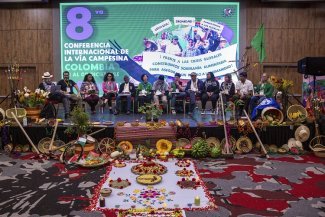Last May, I argued in a piece for Al-Jazeera that the emerging global anti-slavery movement risks becoming no more than a fig leaf for structural political-economic injustice.
I suggested that unless it faces that injustice head-on, it will waste a generational opportunity to make the world more just, focusing instead on making consumers and activists “feel better about feeling bad.”
It doesn’t have to be this way. There is an alternative, and it starts with advocating for unconditional basic income as a genuine anti-slavery strategy.
Only a universal basic income will truly eliminate the economic vulnerability that lies at the root of all labour exploitation.
Slavery, like trafficking and forced labour, is primarily a market phenomenon.
Although often depicted as outside of market relations, the reality is that markets create both supplies of vulnerable workers and demand for their labour.
When a worker finds herself in conditions of extreme exploitation, it is almost always the result of her economic vulnerability coinciding with an employer’s demand for her labour.
This happens because, in market societies, the freedom to refuse any job is the flip-side of the freedom to starve unless you accept one.
Unless you are independently wealthy, you have to work to survive.
For the very poor, where margins are matters of life and death, the price of saying no to even an awful employer is often too high to pay.
This is why ‘market-friendly’ policies will never be enough to abolish ‘modern-day slavery’.
Market-friendly policies do not fundamentally alter the balance of power between the economically weak and the economically strong.
They rely on either goodwill or police enforcement, persuading employers to ‘behave better’, consumers to shop more ethically, and police forces to root out bad apples.
But these policies do nothing about the economic compulsion that renders the poorest vulnerable to malevolent employers adept at evading the authorities.
Basic income
So what is to be done? The one single policy that has most emancipatory potential is the unconditional basic income (UBI).
UBI has a long and respected pedigree.
Thomas Paine advocated a version of it at the dawn of the American Revolution, and it has had modern supporters ranging from Bertrand Russell to John Rawls.
The idea is as simple as it is brilliant: give every citizen an amount of money sufficient to guarantee their survival without any strings attached.
You receive it just by virtue of being a citizen. It will never make you rich, but it will always prevent you from going hungry, or from having to sell yourself into slavery-like labour for want of a better alternative.
When people are first pitched UBI, often, their gut reaction is to ask: “Is this feasible?”
“Won’t everybody just stop working?” These concerns are understandable, but they are also misplaced.
With regards to feasibility, there are two major points.
The first is that economic viability of such a method of wealth redistribution has already been proved in principle in the United Kingdom. Indeed, the welfare state operates on the very same basis, taxing progressively to distribute wealth more evenly.
Second, UBI is likely to be far cheaper and more efficient than any other existing system of social protection.
Currently, governments everywhere waste billions of dollars on policies that fail to reach the most vulnerable.
In the West, expensive means-testing excludes many of those most in need, while governments subsidise poverty wages and give tax breaks to corporations.
In the Global South, fuel and agricultural subsidies frequently fail to reach their intended targets as corrupt bureaucrats siphon money to buy political influence.
Under these circumstances, the costs of distributing a basic income directly to people will be offset by reducing other, less efficient programmes and cutting out the dead weight of political middle-men.
Will people work if they receive a UBI? Of course they will.
Very few are satisfied with simple subsistence; almost everyone wants to improve at least the lives of their children.
No advocate of basic income wants it set high enough to discourage work. Rather, the goal is to give people the real freedom to say “no” to bad jobs and “yes” to good ones.
Remember that in the West, it is the punitive social security system which itself creates unemployment traps.
If instead of tax-breaks or top-ups we gave people UBI, then nobody would ever face the choice of losing money by accepting work.
Empirical evidence
UBI has benefits beyond these practical fundamentals, and for the first time in history, we now have detailed empirical evidence from a developing country to show it.
Unicef recently completed a pilot project with the Self-Employed Women’s Association (SEWA) in India to trial UBI amongst thousands of villagers in the state of Madhya Pradesh. The findings are electric.
First, they show an increase in economic activity, with new small-scale businesses springing up, more work being performed, and more equipment and livestock being purchased for the local economy.
Second, those receiving UBI registered improvements in child nutrition, school attendance and performance, health and healthcare, sanitation and housing.
Greater benefits were recorded for women than for men (as women’s financial and social autonomy were increased), for the disabled than for others, and for the poorest vis-à-vis the wealthy.
But there is a third dimension that should really make the anti-slavery movement sit up and take note.
This is the ‘emancipatory dimension’. The economic security provided by UBI not only increased the political participation of the poor, as it gave them the time and resources necessary to represent their interests against the powerful.
It also freed them from the clutches of moneylenders. As Professor Guy Standing, author of the Unicef study, puts it:
“Money is a scarce commodity in Indian villages and this drives up the price.
Moneylenders and landlords can easily put villagers into debt bondage and charge exorbitant rates of interest that families cannot hope to pay off.”
Unless, of course, they benefit from UBI, in which case they have the liquidity necessary to maintain their freedom even in the case of economic shocks. If you doubt the transformative potential of this work, just watch this 12-minute video and I defy you not to be inspired.
The contemporary anti-slavery movement stands at the forefront of a critical historical juncture.
In the context of global economic crisis, the old social models are breaking down but the new are not yet ready to be born.
Into this vacuum we’ve seen the rise of serious labour exploitation, along with political and consumer activism in response.
At the vanguard of this response stand the modern abolitionists, and they do so with unrivalled discursive power.
Nobody that has a place at the table is for slavery: everybody is against it. This is why abolitionists’ call to end ‘modern-day slavery’ within a generation goes entirely unopposed.
It garners allies ranging from the global business elite to the Pope himself. More than 50,000 people a week sign up to Walk Free campaigns, and over the past several years we have witnessed a tidal-wave of pressure to crack down on extreme exploitation.
So what does all this mean? It means that today’s abolitionists stand on the verge of a once-in-a-century opportunity.
They can play it safe and advocate the market-friendly policies that will—at best—tidy up around the edges.
Or they can go big, they can go revolutionary, and they can organise a global shift in the direction of social justice.
Let us be clear: UBI is not merely the most effective tool for abolishing modern-day slavery. It is a tool for radical social justice, for changing the economic game entirely, by emancipating all of us from economic vulnerability.
If modern abolitionists have a historic mission, it is to complete the task of their predecessors: they must make freedom not just legal, but feasible.
This article was first published on OpenDemocracy’s Beyond Trafficking and Slavery section.









